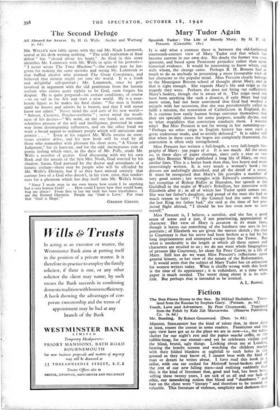Mary Tudor Again IT is odd what a contrast these
is between the old-fashioned nineteenth-century view of Mary Tudor and that which has become current in our own day. No doubt the former was very ignorant, and based upon Protestant prejudice rather than upon historical evidence. It would be interesting to know when, and with whom, the change came. Perhaps R. H. Benson had as much to do as anybody in presenting a more favourable view of her character to the popular mind. Miss Prescott clearly belongs to the Monsignor Benson school of thought about Mary, and in that is right enough. She regards Mary's life and reign as the tragedy they were. Perhaps she does not bring out sufficiently Mary's foolery, though she is aware of it. The reign need not have been anything like such a disaster, if only Mary had had more sense, had not been convinced that God had worked a miracle with her accession, that she was providentially called to fulfil a mission, the restoration of Catholicism in England, &c. It is curious how easily human beings convince themselves that they are specially chosen for some purpose, usually divine, and to what stupidities that conviction conducts them. I wonder why? But Miss Prescott is not far wrong in her summing-up: " Perhaps no other reign in English history has seen such a great endeavour made, and so utterly defeated." It is odder still that when in these cases the hopes are completely frustrated, the conviction is often only strengthened.
Miss Prescott has written a full-length, a very full-length bio- graphy of Mary: Soo pages of it It is too much All the more so, in these days of paper shortage, since only a year or two ago Miss Beatrice White published a long life of Mary, on very similar lines. This is a better book than that, less heavy and more interestingly written. It is very much a woman's book ; the dresses are unfailingly described, and all the detail of a scene. It must be recognised that Mary's life provides a number of very good scenes ; her wrangles with Edward's commissioners, her reception of Bishop Ridley at Hunsdon, her speech at the Guildhall in the midst of Wyatt's Rebellion, her interview with Elizabeth after it ; in all of which her Tudor spirit comes out. She was her father's daughter, and proud of the man she had so much reason to hate : " Jf the Council had the same wit that the late King my father had," she said at the time of her pro- jected flight abroad, " I should be too late even now to save myself."
Miss Prescott is, I believe, a novelist, and she has a good sense of scene and a just, if not penetrating, appreciation of character. Her view of Mary is accurate in its main lines, though it leaves out something of the hardness one sees in her portraits ; of Rli7abeth we are given the merest sketch ; the clue to Courtenay is that his nerve had been broken as a lad by his long imprisonment and attempted escape from the Tower. But what is intolerable is the length at which all these scenes and characters are retailed to us ; we do not want whole biographies of persons like Courtenay, let alone Sir Peter Carew, in a life of Mary. Still less do we want Miss Prescott's reflections upon general history, or her view of the nature of the Reformation. It would seem that the subject of Mary Tudor has an attraction for women writers today. What is chiefly wrong with this book is the time of its appearance ; it is redundant, at a time when paper is much needed. The worst thing about it is its sub- title. But perhaps that is intended to be ironical.
A. L. ROWSE.






























 Previous page
Previous page